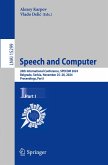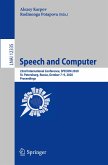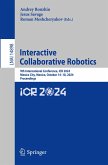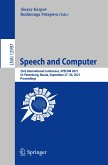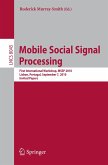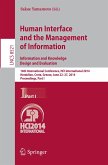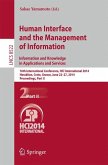Speech and Computer
26th International Conference, SPECOM 2024, Belgrade, Serbia, November 25-28, 2024, Proceedings, Part II
Herausgegeben:Karpov, Alexey; Delic, Vlado
Speech and Computer
26th International Conference, SPECOM 2024, Belgrade, Serbia, November 25-28, 2024, Proceedings, Part II
Herausgegeben:Karpov, Alexey; Delic, Vlado
- Broschiertes Buch
- Merkliste
- Auf die Merkliste
- Bewerten Bewerten
- Teilen
- Produkt teilen
- Produkterinnerung
- Produkterinnerung
The two-volume set LNAI 15299 and 15300 constitutes the refereed proceedings of the 26th International Conference on Speech and Computer, SPECOM 2024, held in Belgrade, Serbia, during November 25-28, 2024.
The 53 full papers included in these proceedings were carefully reviewed and selected from 90 submissions. The book also contains two invited talks in full paper length. The papers are organized in the following topical sections:
Volume I:
Invited papers; automatic speech recognition; speech and language resources; speech synthesis and perception; and speech processing for…mehr
Andere Kunden interessierten sich auch für
![Speech and Computer Speech and Computer]() Speech and Computer53,99 €
Speech and Computer53,99 €![Speech and Computer Speech and Computer]() Speech and Computer81,99 €
Speech and Computer81,99 €![Interactive Collaborative Robotics Interactive Collaborative Robotics]() Interactive Collaborative Robotics60,99 €
Interactive Collaborative Robotics60,99 €![Speech and Computer Speech and Computer]() Speech and Computer97,99 €
Speech and Computer97,99 €![Mobile Social Signal Processing Mobile Social Signal Processing]() Mobile Social Signal Processing37,99 €
Mobile Social Signal Processing37,99 €![Human Interface and the Management of Information. Information and Knowledge Design and Evaluation Human Interface and the Management of Information. Information and Knowledge Design and Evaluation]() Human Interface and the Management of Information. Information and Knowledge Design and Evaluation42,99 €
Human Interface and the Management of Information. Information and Knowledge Design and Evaluation42,99 €![Human Interface and the Management of Information. Information and Knowledge in Applications and Services Human Interface and the Management of Information. Information and Knowledge in Applications and Services]() Human Interface and the Management of Information. Information and Knowledge in Applications and Services42,99 €
Human Interface and the Management of Information. Information and Knowledge in Applications and Services42,99 €-
-
-
The two-volume set LNAI 15299 and 15300 constitutes the refereed proceedings of the 26th International Conference on Speech and Computer, SPECOM 2024, held in Belgrade, Serbia, during November 25-28, 2024.
The 53 full papers included in these proceedings were carefully reviewed and selected from 90 submissions. The book also contains two invited talks in full paper length. The papers are organized in the following topical sections:
Volume I:
Invited papers; automatic speech recognition; speech and language resources; speech synthesis and perception; and speech processing for medicine.
Volume II:
Computational paralinguistics; affective computing; speaker recognition; digital speech processing; natural language processing.
The 53 full papers included in these proceedings were carefully reviewed and selected from 90 submissions. The book also contains two invited talks in full paper length. The papers are organized in the following topical sections:
Volume I:
Invited papers; automatic speech recognition; speech and language resources; speech synthesis and perception; and speech processing for medicine.
Volume II:
Computational paralinguistics; affective computing; speaker recognition; digital speech processing; natural language processing.
Produktdetails
- Produktdetails
- Lecture Notes in Computer Science 15300
- Verlag: Springer / Springer Nature Switzerland / Springer, Berlin
- Artikelnr. des Verlages: 978-3-031-78013-4
- Seitenzahl: 400
- Erscheinungstermin: 22. November 2024
- Englisch
- Abmessung: 235mm x 155mm x 22mm
- Gewicht: 604g
- ISBN-13: 9783031780134
- ISBN-10: 3031780132
- Artikelnr.: 71908039
- Herstellerkennzeichnung Die Herstellerinformationen sind derzeit nicht verfügbar.
- Lecture Notes in Computer Science 15300
- Verlag: Springer / Springer Nature Switzerland / Springer, Berlin
- Artikelnr. des Verlages: 978-3-031-78013-4
- Seitenzahl: 400
- Erscheinungstermin: 22. November 2024
- Englisch
- Abmessung: 235mm x 155mm x 22mm
- Gewicht: 604g
- ISBN-13: 9783031780134
- ISBN-10: 3031780132
- Artikelnr.: 71908039
- Herstellerkennzeichnung Die Herstellerinformationen sind derzeit nicht verfügbar.
1 Computational Paralinguistics.- A Cross-Multi-Modal Fusion Approach for Enhanced Engagement Recognition.- Automatic Assessment of Signs of Alcohol Dependency Syndrome from Spontaneous Speech.- An Enhanced Compact Convolution Transformer for Age, Gender and Emotion Detection in Egyptian Arabic Speech.- RAG and Few-Shot Prompting in Emotional Text Generation.- Sentiment Analysis for Egyptian Arabic-English Code-Switched Data using Traditional Neural Models and Advanced Language Models.- Automatic Detection of Irony Based on Acoustic Features and Facial Expressions.- Affective Computing.- Emotion Recognition by Vocalizations of Nonhuman Primates: Human and Automatic Classification.- MMHS: Multimodal Model for Hate Speech Intensity Prediction.- Multimodal Emotion Recognition using Compressed Graph Neural Networks.-Utilizing Speaker Models and Topic Markers for Emotion Recognition in Dialogues.- How Children Recognize Emotions from Video and Audio.- Speaker Recognition.- On the Influence of CNN-based Feature Learning Modules in Neural Speaker Verification Framework.- Voice Cloning and Mismatch Conditions in Forensic Automatic Speaker Recognition.- Transformation of Emotional Speech to Anger Speech to Reduce Mismatches in Testing and Enrollment Speech for Speaker Recognition System.- Investigating Data Requirements for Hindi Speaker Recognition: A Comparative Study with English.- Practical Evaluation and Validation of Methods for Automatic Speaker Identification (as Applied to Various Languages).- Digital Speech Processing.- In Pursuit for the Best Error Metric for Optimisation of Articulatory Vowel Synthesis.- Exploring MetaConformer for Speech Enhancement.- Integration of Short-Term and Long-Term Harmonic Peaks in a Two-Level Discriminative Weight Training Framework for Voice Activity Detection.- Separating Party Conversation by Applying Contrastive Learning Methodology.- DuFCALF: Instilling Sentience in Computerized Song Analysis.- Natural Language Processing.-Harnessing Knowledge Distillation for Enhanced Text-to-Text Translation in Low-Resource Languages.- Bias Unveiled: Enhancing Fairness in German Word Embeddings with Large Language Models.- Conformer LLM - Convolution Augmented Large Language Models.- How to Detect Imbalances in the Google Books Ngram Corpus?.- Predicting the Valence Rating of Russian Words Using Various Pre-Trained Word Embeddings.- 3 Ancient Egyptian Hieroglyphic Texts Structure Identification.
1 Computational Paralinguistics.- A Cross-Multi-Modal Fusion Approach for Enhanced Engagement Recognition.- Automatic Assessment of Signs of Alcohol Dependency Syndrome from Spontaneous Speech.- An Enhanced Compact Convolution Transformer for Age, Gender and Emotion Detection in Egyptian Arabic Speech.- RAG and Few-Shot Prompting in Emotional Text Generation.- Sentiment Analysis for Egyptian Arabic-English Code-Switched Data using Traditional Neural Models and Advanced Language Models.- Automatic Detection of Irony Based on Acoustic Features and Facial Expressions.- Affective Computing.- Emotion Recognition by Vocalizations of Nonhuman Primates: Human and Automatic Classification.- MMHS: Multimodal Model for Hate Speech Intensity Prediction.- Multimodal Emotion Recognition using Compressed Graph Neural Networks.-Utilizing Speaker Models and Topic Markers for Emotion Recognition in Dialogues.- How Children Recognize Emotions from Video and Audio.- Speaker Recognition.- On the Influence of CNN-based Feature Learning Modules in Neural Speaker Verification Framework.- Voice Cloning and Mismatch Conditions in Forensic Automatic Speaker Recognition.- Transformation of Emotional Speech to Anger Speech to Reduce Mismatches in Testing and Enrollment Speech for Speaker Recognition System.- Investigating Data Requirements for Hindi Speaker Recognition: A Comparative Study with English.- Practical Evaluation and Validation of Methods for Automatic Speaker Identification (as Applied to Various Languages).- Digital Speech Processing.- In Pursuit for the Best Error Metric for Optimisation of Articulatory Vowel Synthesis.- Exploring MetaConformer for Speech Enhancement.- Integration of Short-Term and Long-Term Harmonic Peaks in a Two-Level Discriminative Weight Training Framework for Voice Activity Detection.- Separating Party Conversation by Applying Contrastive Learning Methodology.- DuFCALF: Instilling Sentience in Computerized Song Analysis.- Natural Language Processing.-Harnessing Knowledge Distillation for Enhanced Text-to-Text Translation in Low-Resource Languages.- Bias Unveiled: Enhancing Fairness in German Word Embeddings with Large Language Models.- Conformer LLM - Convolution Augmented Large Language Models.- How to Detect Imbalances in the Google Books Ngram Corpus?.- Predicting the Valence Rating of Russian Words Using Various Pre-Trained Word Embeddings.- 3 Ancient Egyptian Hieroglyphic Texts Structure Identification.


